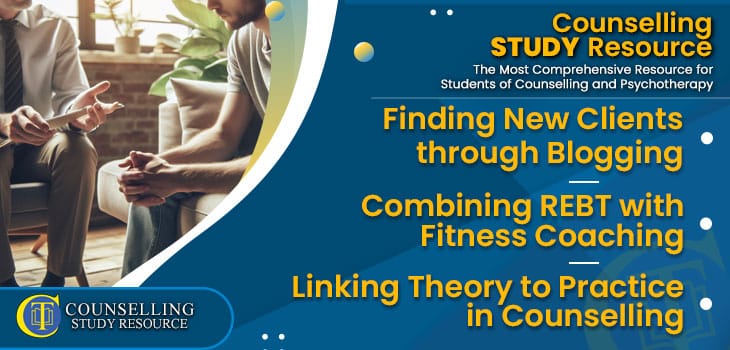294 – Linking Theory to Practice in Counselling
Finding New Therapy Clients through Blogging – Combining REBT with Fitness Coaching
In Episode 294 of the Counselling Tutor Podcast, your hosts Rory Lees-Oakes and Ken Kelly are back with this week’s three topics:
- First up in ‘Ethical, Sustainable Practice’, we look at how to unlock new clients through blogging.
- Then in ‘Practice Matters’, Rory speaks to Ruth Hill about how she combines REBT with fitness coaching.
- And lastly in ‘Student Services’, Rory and Ken look at linking theory to practice in counselling, or recognising where theory applies to actual practice in the therapy room.
Finding New Therapy Clients through Blogging [starts at 03:25 mins]
This segment of the Counselling Tutor Podcast is sponsored by
WebHealer.net
- WebHealer are the go-to provider of websites for private practitioners in the UK.
- Established over 20 years, WebHealer offers a non-technical and fully supported service to help therapists grow their private practice.
- Just one customer from your website each year pays for their service.
Go to WebHealer.net and use coupon CT100 for £100 off their "Do it for me" service.
When it comes to gaining clients, your online presence can be a great way to encourage people to get in contact with you. In this section, Rory and Ken look at how having a blog can help draw in these potential clients:
- People very often do their research before committing to a service or a purchase.
- Potential clients might be looking for a counsellor who’s writing about things they’ve gone through, from a client’s perspective.
- Know, like, and trust – these are all key when it comes to making a decision, just like when buying clothing etc.
- Write about anything you specialise in, or any niches you have.
- Regularly updating your blog will enhance your visibility on search engines.
- Search engines are very competitive, you want to be using keywords to appear as close to the top as you can.
- Think about educating and empowering – you’re helping them to make their own informed decision.
- Helps a possible client to feel less alone in their troubles and experiences.
- Include a call to action, encourage them to take the next step.
- Having a blog can bring networking opportunities with other professionals.
Theory to Practice is sponsored by
Counselling Skills Academy
Learn counselling techniques by seeing counselling skills used in real sessions by qualified therapists.
Real sessions – real-life presentations – real skills.
Combining REBT with Fitness Coaching [starts at 26:11 mins]
In this week’s ‘Practice Matters’, Rory speaks with Ruth Hill about how she uses REBT in relation to fitness coaching.
The key points of this discussion include:
- Exercise can make significant contributions in reducing anxiety and depression.
- Motivation is the thing you're working towards – the thing that compels you to exercise, take action.
- REBT looks for unhealthy beliefs which can trigger uncomfortable, unpleasant emotions.
- Creates a healthy preference instead of a need for certainty.
- You can explore the link between the symptoms of anxiety, excitement, and exercise.
- Changing your thinking – is this helpful? Have you checked that this belief is accurate?
- Changing your vocabulary – acknowledge when you’re exercising, even something as simple as walking around a shopping centre.
- Balancing rational thought.
- The power of positive self-talk.
Counselling Study Resource:
Assignment Guidance & Study Support for Counselling Students
- Academic Lecture Library - Lectures that cover key theory, skills and professional development linked to your counselling study.
- Assignment Guidance - Complete assignment exemplars and portfolios of work that have been passed by both tutors and awarding bodies.
- Theory Decoded, Skills Mastery and More - Counselling theories and skills are broken down into easy-to-understand ‘chunks’, with clear examples to guide you.
Linking Theory to Practice in Counselling [starts at 49:25 mins]
Linking theory to practice is a necessary skill during your counselling training. In this section, Rory and Ken share some helpful tips on how to recognise these links:
- Don’t see the client as a theory – think about how the theory applies to the client.
- Reflect on the general theme of a client’s difficulty and link that to theory.
- The theory will naturally weave its way in – the trick is dissecting and pulling it out afterwards.
- Asking a peer, being the observer, training yourself to pick out the theory – these will help you link theory to practice in counselling.
- Use your process notes to help you recognise these themes.
- You might have to wait for themes to emerge in their own time as the client opens up and shares things at their own pace.
Get on-demand Certified CPD that is implementable in your practice
Counsellor CPD Library
- Over 150 hours of on-demand CPD lectures to help you stay current with your CPD ethical requirements
- Support, and be supported, by thousands of other counsellors as a member of the exclusive online community.
- Access your learning anytime you want ... anywhere you choose ... using any device type — desktop or mobile.

Free Handout Download
Eight Compelling Reasons for Counsellors to Start Blogging
